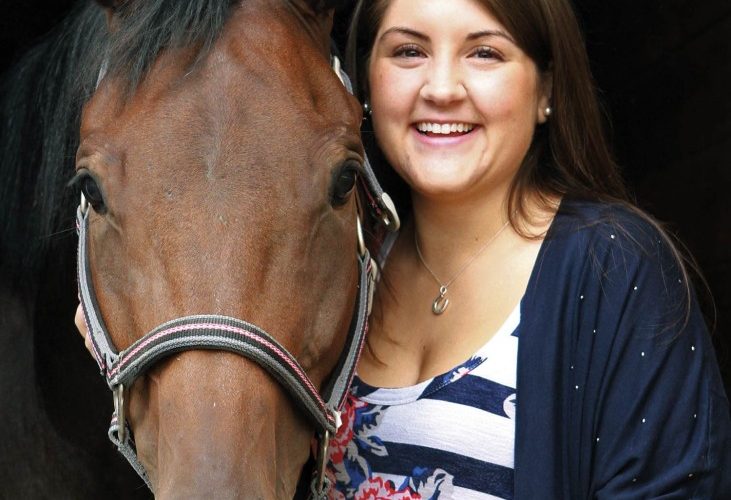A young Beverly resident crusades to save retired and forgotten horses from slaughter. By Alyssa Rosenthal – Photograph by Tracy Emanuel
Watching Monaco, an 18-month-old colt, thrust his nose into the palm of Lexi Chase, his new owner, it was hard to believe that the first time he was handled by humans was only a few weeks earlier, when he arrived at the Hope4Horses holding barn in Hamilton. Before adopting him, “I saw a video of him online, completely terrified,” says Chase, a 19-year-old college student from Beverly. “He’s still very unsure.”
Monaco is the second and newest addition to the Chase’s family of rescued horses, joining Pippa, a five-year-old mare that Lexi adopted in April. “I looked at the photo for a few days, and knew it was something I had to do,” says Chase, who placed an 11th-hour bid for the horse through Another Chance 4 Horses, a nonprofit broker program that works to find homes for horses that would otherwise be shipped to slaughter houses in Canada or Mexico. Bids are placed “sight unseen, so you have no idea what you are getting into,” explains Chase, who filled out forms and sent in a payment of $805 without telling her mother, Lisa, and unsure if she had even submitted the bid in time. After buying Pippa, Chase looked up the horse’s pedigree, only to find that the former racehorse was a great-granddaughter of Secretariat, the record-setting racehorse and Triple Crown winner.
Even though Lisa didn’t learn about the new addition to her family until after Lexi’s bid, she and her daughter were very involved in taking care of Pippa when the horse arrived in Hamilton. Avid volunteers at Hope4Horses, a local organization that works to save horses from slaughter, they worked full time at the barn while Pippa was quarantined there before moving her to a barn closer to their home. Lexi explains the need for the quarantine period, as the horses come from kill pens where they are in very close proximity to hundreds of other horses and “sometimes come with fevers and illnesses,” or, in Monaco’s case, fear of human contact. “Information about the horses’ past is little to nothing,” Lexi adds.
Though she isn’t sure if she will continue to personally rescue horses, Lexi is constantly communicating with people online who work together to raise funds and find homes for horses headed to auction, where anyone from horse enthusiasts to, yes, meat buyers can bid on them. “Everyone [online] is a stranger, but we all have the same goal,” she says. So far, Lexi has been instrumental in the rescue of about 20 horses, finding them new homes or reuniting them with past owners.
Even Chase’s 11-year-old sister, Laina, is involved with the cause. Laina recently organized a lemonade stand and set up a whiteboard bearing the words “Your lemonade will save a horse from slaughter.” On July 7, the youngest Chase adopted her own horse, a miniature horse named Summer. Together, the Chases hope to continue carving new paths for horses heading to a premature end. “Even if it’s not myself [doing the] rescuing, I’ll constantly network,” she says.

